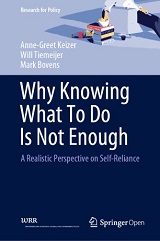
|
FreeComputerBooks.com
Links to Free Computer, Mathematics, Technical Books all over the World
|
|
- Title: Why Knowing What To Do Is Not Enough: A Realistic Perspective on Self-Reliance
- Author(s) Anne-Greet Keizer, Will Tiemeijer, Mark Bovens
- Publisher: Springer; 1st edition (September 19, 2019); eBook (Creative Commons Licensed)
- License(s): CC BY 4.0
- Hardcover: 166 pages
- eBook: PDF (161 pages) and ePub
- Language: English
- ISBN-10/ASIN: 9402417249/B07Y4XV8GZ
- ISBN-13: 978-9402417265
- Share This:

|
This open access book sets out to explain the reasons for the gap between "knowing" and "doing" in view of self-reliance, which is more and more often expected of citizens. In today's society, people are expected to take responsibility for their own lives and be self-reliant.
This is no easy feat. They must be on constant high alert in areas of life such as health, work and personal finances and, if things threaten to go awry, take appropriate action without further ado.
What does this mean for public policy? Policymakers tend to assume that the government only needs to provide people with clear information and that, once properly informed, they will automatically do the right thing. However, it is becoming increasingly obvious that things do not work like that. Even though people know perfectly well what they ought to do, they often behave differently.
Why is this? This book sets out to explain the reasons for the gap between 'knowing' and 'doing'. It focuses on the role of non-cognitive capacities, such as setting goals, taking action, persevering and coping with setbacks, and shows how these capacities are undermined by adverse circumstances.
By taking the latest psychological insights fully into account, this book presents a more realist perspective on self-reliance, and shows government officials how to design rules and institutions that allow for the natural limitations in people's 'capacity to act'.
About the Authors- N/A
 Similar Books:
Similar Books:
-
 Paths: Why is Life Filled with so many Detours?
Paths: Why is Life Filled with so many Detours?
This book explores the amazing similarity between paths taken by people and many other things in life, and its impact on the way we live, teach and learn. Offering insights into the new scientific field of paths as part of the science of networks, etc.
-
 Mind Hacking: How to Change Your Mind for Good in 21 Days
Mind Hacking: How to Change Your Mind for Good in 21 Days
Teaches you how to reprogram your thinking - like reprogramming a computer - to give you increased mental efficiency and happiness. Learn to take charge of your mind and banish negative thoughts, habits, and anxiety - in just 21 days!
-
 The Amazing Journey of Reason: from DNA to Artificial Intelligence
The Amazing Journey of Reason: from DNA to Artificial Intelligence
This book analyses the evolution of complex structures (Organisms, or organized, living, systems) in the universe - from the subatomic particles after the Big Bang onwards - in order to understand the emergence of today's interconnected society.
-
 Waking Up: Freeing Ourselves From Work (Pamela Satterwhite)
Waking Up: Freeing Ourselves From Work (Pamela Satterwhite)
How we came to be servants of an economic system, rather than the other way around. It proposes a theory of wholism for critiquing the present reality and envisioning the world we want, and then suggests concrete actions to help us get there.
-
 Modeling Creativity - Case Studies in Python (Tom De Smedt)
Modeling Creativity - Case Studies in Python (Tom De Smedt)
This book is to model creativity using computational approaches in Python. The aim is to construct computer models that exhibit creativity in an artistic context, that is, that are capable of generating or evaluating an artwork (visual or linguistic), etc.
-
 Hacker, Hoaxer, Whistleblower, Spy: Many Faces of Anonymous
Hacker, Hoaxer, Whistleblower, Spy: Many Faces of Anonymous
The ultimate book on the worldwide movement of hackers, pranksters, and activists collectively known as Anonymous. It is filled with insights into the meaning of digital activism and little understood facets of culture in the Internet age.
-
 The Secret of Success (William Walker Atkinson)
The Secret of Success (William Walker Atkinson)
One of the most influential books written on the subject of attaining success. Although everyone's definition of success may be different, the common ground is the attainment of each one's particular goal. The key point to this book is that of 'individuality'.
-
 What is and What will be: Integrating Spirituality and Science
What is and What will be: Integrating Spirituality and Science
This book integrates science with values and meaning by making the simplest possible assumption about the connection between physical structure and conscious experience. This follows from Gödel's Incompleteness Theorem and the assumptions of this book.





